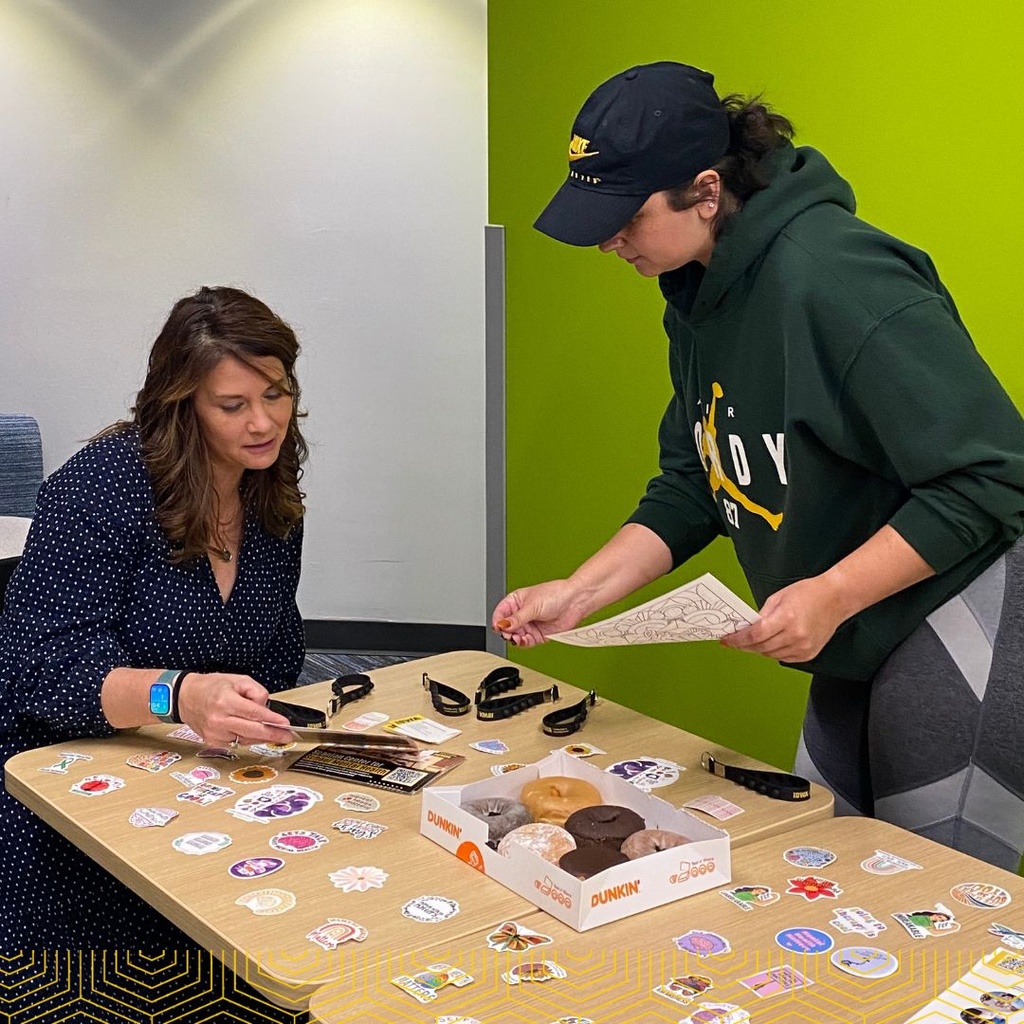If this is an emergency or someone is in imminent danger, please call 911 and/or go to the nearest Emergency Department.
Strengthening Support and Protecting Lives
The Scanlan Center for School Mental Health is here to walk alongside Iowa’s educators, families, and students with resources that promote prevention, connection, and care.
Our suicide prevention offerings include:
- Evidence-based suicide prevention trainings
- Individual counseling and child psychiatry services
- Counseling groups for teens and parents/caregivers
- Self-paced online learning modules
- Research-based briefs, blogs, and tools for connecting with teens
We offer three evidence-based suicide prevention training formats tailored to meet the distinct needs of K-12 schools, college campuses, communities, and organizations. Trainings can be brought directly to your community, or you can join one of our regularly scheduled sessions on the University of Iowa campus.

LivingWorks Applied Suicide Intervention Skills Training (ASIST)
LivingWorks ASIST is a two-day interactive workshop in suicide first-aid. ASIST teaches participants to recognize when someone may have thoughts of suicide and work with them to create a plan that will support their immediate safety. As the world’s leading suicide intervention workshop, LivingWorks’ ASIST program is supported by numerous evaluations, including independent and peer-reviewed studies.

LivingWorks safeTALK Suicide Prevention Training
LivingWorks safeTALK prepares people to be more alert to suicide and to help persons with thoughts of suicide make safe connections. The intervention goal is that persons with thoughts of suicide connect with someone who will help them keep safe from suicide and access further support. Participants will be able to facilitate safe dialogue and connect someone to resources that help them keep safe from suicide.

Suicide Prevention in Schools Workshop
School staff play a critical role in identifying signs of distress, as they engage with students consistently and are often the first to notice changes in behavior or emotional well-being. This workshop, designed specifically for educators, aims to equip participants with useful information and skills they can utilize in everyday interactions with students who are having thoughts of suicide.
Upcoming Suicide Prevention Trainings

LivingWorks Applied Suicide Intervention Skills Training (ASIST)
The SCSMH Clinic offers individual counseling, group counseling, and child psychiatry for suicide prevention. Our clinicians have expertise in working with individuals in crisis. Learn more about our clinical services.
Current SCSMH counseling groups with a focus on suicide prevention and postvention are listed below. Group counseling enrollment occurs on a rolling basis, and groups run when there are enough participants. Would you like to join a future group counseling session? Email scsmh-clinic@uiowa.edu to express your interest.

Supporting Caregivers of Youth with Suicidal Thoughts & Self-Harm
What to Expect
Caring for youth who have experienced suicidal thoughts and/or self-harm can feel overwhelming and isolating. If you are looking for support, consider joining our 8-week Supporting Caregivers of Youth with Suicidal Thoughts & Self-Harm Group.
This group is aimed at helping you learn about youth suicide and self-harm, develop skills in supporting yourself and your child, and connect with others in a confidential, supportive space.
This group is open to parents/caregivers of Iowa K-12 students.
The group will meet either online or in-person 1x per week for 60 minutes over 8 weeks.

Distress Tolerance Skills Group
What to Expect
Emotional dysregulation can make daily life feel overwhelming. Through our 7-week DBT skills group, teens will gain tools for responding to emotional intensity in healthier ways.
Together, participants will build skills in:
- Distress Tolerance – surviving tough situations without making things worse
- Mindfulness – staying present and increasing awareness to gain more control
Before joining, each student will meet with one of our clinicians for a diagnostic evaluation and intake session. This ensures the group is the right fit and provides students and parents/caregivers with helpful information.
Who can join? This group is open to 13-17-year-old Iowa K-12 students who experience challenges with anxiety, depression, impulsivity, self-harm, and/or thoughts of suicide.
When and where? This group will meet 1x per week for 60 minutes over 7 weeks at the Blank Honors Center on the University of Iowa campus.

Coping with Grief and Loss Group
What to Expect
Life after loss can feel overwhelming. If you are grappling with grief, consider joining our 8-week, online Coping with Grief and Loss Group.
This virtual group is aimed at helping you learn about the grief process, develop skills in mindfulness and self-compassion, and connect with others in a confidential, supportive space. This psychoeducational group will utilize skills from Acceptance and Commitment Therapy (ACT).
Our suicide prevention modules—created by national experts—take around three hours to complete. Learners move through videos, readings, and reflection activities at their own pace, with up to one month to finish each module. These can also be paired with other school mental health and well-being modules to earn one Iowa educator licensure renewal credit.

Suicide Prevention and Postvention: What Educators Need to Know
Instructor: DeQuincy Meiffren-Lezine, Ph.D., CEO, Prevention Communities
This professional learning experience will increase your understanding of suicide prevention, intervention, and postvention in an education context, and it will offer an array of evidence-based tools that school staff can use to recognize suicide risk and respond effectively.
Learning Objectives:
- Identify the five (5) major stages in the progression of risk that can lead to suicide (the Suicidal Crisis Path).
- Categorize programs and activities according to five (5) intervention points in the Suicidal Crisis Path.
- Summarize risk assessment using risk scales such as the Columbia Suicide Severity Rating Scale (C-SSRS).
- Outline a Safety Plan with six (6) key sections that provide practical guidance for managing suicide risk.

Suicide Prevention Legal Issues and Best Practices for Suicide Postvention
Instructor: Scott Poland, Ed.D., Professor at the College of Psychology and Director of the Suicide and Violence Prevention Office for NSU Florida in Fort Lauderdale, FL
This professional learning experience will increase the understanding of school-based mental health professionals* around their role in suicide prevention, intervention, and postvention practices in their schools, and it will offer an array of evidence-based tools that these professionals can use to recognize suicide risk and respond effectively.
Learning Objectives:
- Become familiar with student behaviors related to suicide and the components of comprehensive suicide prevention, intervention, and postvention in schools.
- Understand the importance of responding immediately to screen students when a student is suspected of being at-risk for suicide and the importance of parent notification, referral to community-based professionals, and follow-up at school.
- Identify the goals of suicide postvention and the best practices and resources for suicide postvention in schools.
- Understand key legal issues in lawsuits filed against schools after a student suicide, and the lessons for suicide prevention from the legal causes.
*School psychologists, school counselors, social workers, crisis response team members, and behavior interventionists.

Suicide Prevention and Postvention: Working with Families and Communities
Instructor: Nicole Del Castillo, M.D., M.P.H.; Clinical Assistant Professor, Clinical Sciences, Carle Illinois College of Medicine
This professional learning experience will provide school administrators and personnel with the tools needed to provide information for families and community members regarding suicide and other related mental health issues.
Learning Objectives:
- Identify effective strategies for helping families and community members learn about suicidality, prevention, and postvention in schools.
- Recognize the critical roles district and school personnel play in supporting families and community members through suicide postvention.
- Use effective strategies for supporting suicide prevention and postvention efforts with families and communities.
- Practice Brief: K-12 Suicide Prevention
- This practice brief provides K-12 educators with evidence-based resources to identify and intervene when students are struggling with suicidal thoughts and behaviors.
- Practice Brief: Non-Suicidal Self-Injury: Considerations for K-12 Educators
- This practice brief includes a general description of non-suicidal self-injury (NSSI), prevention, and assessment strategies, including developing a school protocol, intervention strategies, and additional resources.
- Tool: Nurturing Healthy Minds: Detecting Stress, Distress, or Crisis in Your Child
- Sometimes, though, our kids might struggle in ways that aren’t immediately obvious. That’s why it’s important to have the tools to recognize the difference between everyday stress and more serious challenges they might be dealing with. Learn more about how to spot signs of growing challenges in your child’s mental health and find resources for additional help.
- Blog: Let's Talk: Conversation Starters for Connecting with Kids and Teens about Mental Health (Part One)
- When it comes to talking about mental health with children or teens, many parents struggle to find the right words. Discover practical, research-backed tips to foster a safe, open environment where your children feel heard, understood, and supported.
- Blog: Let's Keep Talking: Connecting with Teens about Mental Health, Suicidal Ideation, and Self-Harm (Part Two)
- In this blog, we take a closer look at the mental health challenges teens may face, including suicide and self-harm. You’ll find key definitions, potential warning signs to watch for, and compassionate strategies for starting these tough but vital conversations with your teen.
- Webinar: Let’s Talk: Conversation Starters for Connecting with Kids and Teens about Mental Health (recorded January 14, 2025)
- This free webinar equips parents and caregivers with developmentally appropriate strategies for discussing emotions, mental health, suicide, and therapy with children and teens.
Other Helpful Suicide Prevention Resources
988 Suicide & Crisis Lifeline
- Call 988
- 988lifeline.org
- Español: 988lifeline.org/es/home
- Deaf and Hard of Hearing, use your preferred relay service, dial 711 then 988, or 988lifeline.org/help-yourself/for-deaf-hard-of-hearing.
Iowa Mobile Crisis
The Crisis Text Line
- Text HOME to 741741
- crisistextline.org
Your Life Iowa
- Call 855-581-8111; Text 855-895-8398
- yourlifeiowa.org
Iowa Crisis Service Resources
The Trevor Lifeline
- Call 1-866-488-7386; Text START to 678-678
- thetrevorproject.org/get-help
American Foundation for Suicide Prevention
I'm Glad You Stayed Project
Veteran’s Crisis Line
- Call 988 and Dial 1; Text 838255
- veteranscrisisline.net

